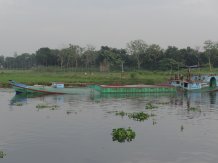articles

The research projects aim to boost local resilience to the devastating effects of natural disasters across South East Asia
Exeter leads research into impacts of flooding and drought in South East Asia
Experts from the University of Exeter’s College of Engineering, Mathematics and Physical Sciences (CEMPS) will spearhead two pioneering new research projects that aim to boost local resilience to the devastating effects of natural disasters across South East Asia.
The international research projects will conduct crucial new research that aims to boost resilience to hazards such as floods, droughts, storm surges and landslides.
They are among 18 projects, supported in partnership with leading scientists from Indonesia, Malaysia, Philippines, Thailand and Vietnam, to receive funding jointly from the Newton Fund, NERC, ESRC and the national research councils in those South East Asian countries, announced today.
Professor Jim Haywood, an atmospheric science expert from Exeter’s Mathematics department, will lead the first project entitled ‘IMpacts of Precipitation from Extreme StormS (IMPRESS).
The project, which has received a grant of £310, 859 – match funded by partners in Malaysia – will assess the physical and societal impacts of extreme flooding events caused by future climate change.
Professor Haywood said: “My team and I are absolutely delighted to have received this funding for our research project. Working with the University of Reading, we are aiming to use new storm compositing techniques, applied to an array of climate model projections, to assess the changes in extreme rainfall over Malaysia.
“Our partners from the Universite Sains Malaysia can then use this new information about the severity and frequency of extreme rainfall to assess the physical and societal impacts of flooding events under future climate change.”
The second project, led by water management expert Professor Slobodan Djordjevic from Exeter’s Engineering department, is entitled ‘ENRICH: Enhancing Resilience for future Hydro-meteorological extremes in the Mun river basin in the North-East of Thailand’.
Working with Professor Mat Collins and Dr Albert Chen, also from Exeter, and colleagues from the Asian Institute of Technology (AIT) in Thailand, the project aims to measure how climate variability, climate change and land-use change impact the severity of natural disasters, focusing on drought.
The project received £373,098 funding which is also matched by the Thailand Research Fund (TRF), will recommend new techniques to sustainably manage water resources and improve water security in the Mun basin in the coming decades.
Professor Djordjevic added: “We are extremely pleased to be able to work on this project with AIT, which has consistently been a Thai top ranked HE institution in a range of engineering, environmental sciences and computer science subjects. This grant will provide opportunities for a wider collaboration between CEMPS and AIT.”
ENRICH project will have the inception workshop and kick-off meeting on 5-6 February in Bangkok, with participation of five Exeter staff and over fifty local experts and stakeholders.
Hydro-meteorological hazards pose a direct threat to lives and livelihoods of people living in South East Asia, from death and injury to damaged or destroyed homes, businesses, transport links, power supplies and agricultural land.
Climate change and population growth are increasing the number of people at risk, and changes in land-use and the expansion of urban areas has led to a shift in how floods and droughts impact communities.
NERC Associate Director of Research Ned Garnett said: “To increase resilience in countries prone to hydrometeorological hazards, we need to gain a better understanding of the likely environmental and social impacts. This programme of research will deliver this understanding enabling the development and implementation of effective adaptation and mitigation measures. For example, helping local communities to design effective flood defences or restore natural defences, such as mangroves.”
Professor Alison Park, Director of Research at ESRC said: “ESRC’s involvement in four of the five programmes reflects the value of social science in understanding of how local, regional and national governance processes and policies affect the severity and duration of hydrometeorological hazards. The programmes will provide important groundwork to improve responses to these weather hazards and will help protect against injury and environmental damage.”
Professor Krasimira Tsaneva-Atanasova, Associate Dean (International and Development) for the College of Engineering, Mathematics and Physical Sciences at the University of Exeter added: “Responding to hydro-meteorological challenges in South East Asia can require the development of innovative new approaches; key factors include affordability, portability and the requirement for on-site operation in often remote locations.
“Exeter is a leader in science and innovation and these projects draw together our expertise to help tackle some of the biggest hydro-meteorological issues faced by developing countries, including extreme storms, floods and droughts.”
All 18 research projects are funded through the £7m Understanding the Impacts of Hydrometeorological hazards in South East Asia programme.
Date: 29 January 2019